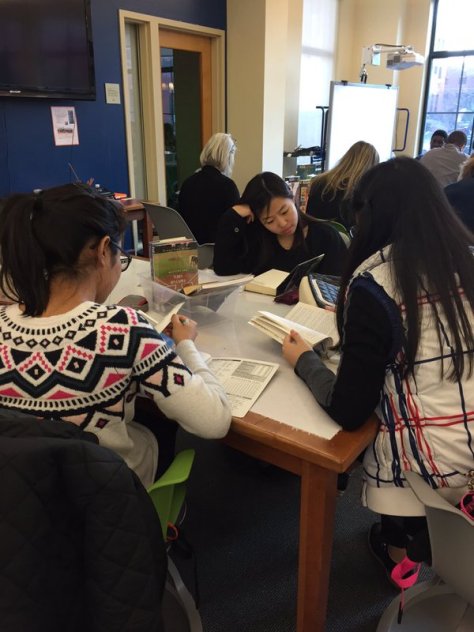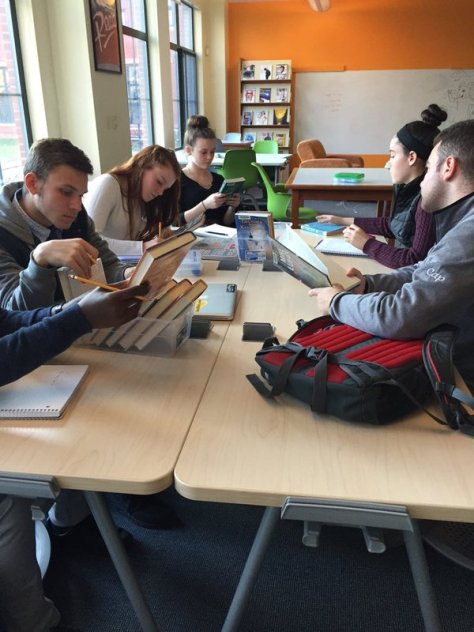 I’ve been meaning to get around to starting independent reading in my classroom for years. Honest. But like so many things I’ve been “meaning” to do, I put it off. I did finally buy Penny Kittle’s Book Love back in June, and I fully intended to read it. It is true that I had a busier than normal summer. So busy it might in fact be called a non-summer. But I didn’t pick it up and didn’t pick it up. Right around mid-fall, I could feel that malaise creeping in. I’m not talking about the students. I’m talking about me. Then I went to NCTE, which always rejuvenates me and keeps me going for the rest of the school year. Once again, I heard the discussions about independent reading. Finally, something clicked. I think there is a statistic about how many times you have to be exposed to an idea before you pay attention to it. I decided to do it, and I decided not to wait until the second semester starts in January. We’re starting right now, this first week of December. Independent reading is finally going to happen for real in my classroom.
I’ve been meaning to get around to starting independent reading in my classroom for years. Honest. But like so many things I’ve been “meaning” to do, I put it off. I did finally buy Penny Kittle’s Book Love back in June, and I fully intended to read it. It is true that I had a busier than normal summer. So busy it might in fact be called a non-summer. But I didn’t pick it up and didn’t pick it up. Right around mid-fall, I could feel that malaise creeping in. I’m not talking about the students. I’m talking about me. Then I went to NCTE, which always rejuvenates me and keeps me going for the rest of the school year. Once again, I heard the discussions about independent reading. Finally, something clicked. I think there is a statistic about how many times you have to be exposed to an idea before you pay attention to it. I decided to do it, and I decided not to wait until the second semester starts in January. We’re starting right now, this first week of December. Independent reading is finally going to happen for real in my classroom.
At the beginning of the school year, I ask students to write an educational autobiography for me. I want to know what school has been like for my students. I want to know about how they perceive themselves as students, as readers, and as writers. Almost all of my eleventh graders confessed they don’t like to read and do not read for pleasure. That’s a staggering statistic. They are not going to magically become life-long readers, which I say is one of my goals for them, if I don’t do something. I think the students in my class, the ones who say they don’t like reading, just don’t know what they like to read. They haven’t found a book yet. I will admit that I try some different things that make literature study more interesting for students. Literature circles, for example. One of my students confessed he had never read so far into a book as he had the book my students were reading in November, The Adventures of Huckleberry Finn. I attribute that stamina to the literature circle.
If I had ever been asked to choose my own books to read for pleasure in school, it would have been my favorite class ever, and those ten minutes or so at the beginning of the period would have been my favorite part of the day. But I was a reader, and I became a reader in spite of my teachers, not because of them. I don’t actually have memories of reading something I really liked in school (after elementary school, that is) until 11th grade, when we read To Kill a Mockingbird, but even in that case, I didn’t choose to read that book. It was assigned. I read my own things outside of school. I actually liked reading, and I didn’t enjoy the selections chosen by my teachers. Sometimes, I even faked my way through reading because I couldn’t keep up with the assigned reading. I didn’t want to fake it. I actually wanted to read the books. I even faked my way through one of the books I was assigned in college. Even though I didn’t always do my assigned reading, I actually really wanted to read and loved to read. If my students don’t love to read, think how much more they must be faking their way through reading. Sometimes, later on (never at the time), former students have confessed to me that they didn’t read a text I assigned.
I firmly believe no one is going to die if they don’t read a certain book. I know that feeling is pervasive in secondary education, but one reason I don’t share it is that I myself had such a patchy high school education that I managed to graduate and even major in English Education (which at my school, meant only two fewer English courses, before you complain it isn’t as rigorous as English) without having ever read such essentials as The Adventures of Huckleberry Finn, The Great Gatsby, The Scarlet Letter, and so many others. In fact, had I not read them on my own, I also would have missed The Catcher in the Rye and Lord of the Flies. Can you believe I’m still here to tell the tale? What happened was that I read all those books later. I actually think I read them at the perfect time for me to read them, too. So even though I love leading students through a work of literature and watching them enjoy it, I also want them to become readers, and I think this year in particular, my students need my help to figure out how to do that.
Enter Book Love. Though I’m not finished reading it yet, I already have some advice on how to start, which is what I really needed. I had several questions about how this should look, including what to grade and how to grade it. Kittle covers all of that ground in the book. I scheduled a visit to the library, and our librarian plans to book talk some titles so that my students can make their first selections. I have already begun the process of hauling my own books to donate to my classroom library. I even spent some time last week organizing the books on shelves. Once my library is big enough, I’ll organize it by genre, which I think will help students find what they want to read more quickly.
One thing I especially appreciate about Kittle’s approach is that she doesn’t recommend scrapping the literature study in favor of all independent reading. I find our discussions of the literature we read together to be rich and rewarding. I have heard a lot of teachers who seem to me to be ditching the full-class novel entirely in favor of independent reading, and I am not ready to do that at all. Kittle says the key is balance. We need to create life-long learners and build time for independent reading. But students also benefit from full-class novels. I actually don’t teach a lot of novels in my eleventh grade classes, so I think weaving independent reading into the curriculum should be fairly easy and shouldn’t strain my curriculum too much. But I say that if it does, then perhaps some texts need to go. I am here to serve the students, and that doesn’t mean cramming as much curriculum in as I can.
Other teachers at our school are trying independent reading with great success. It feels great to be in their classrooms, watching them conference with students about their reading and talking about books. As much as I knew independent reading was the right thing to do and as much as I wanted to do it, I somehow didn’t find the time to make it work. I think I just needed to hear one more time how important it is. Here we go. I’ll let you know what happens.
Like this:
Like Loading...


 Slice of Life is a daily writing challenge during the month of March hosted by Two Writing Teachers. Visit their blog for more information about the challenge and for advice and ideas about how to participate.
Slice of Life is a daily writing challenge during the month of March hosted by Two Writing Teachers. Visit their blog for more information about the challenge and for advice and ideas about how to participate.





